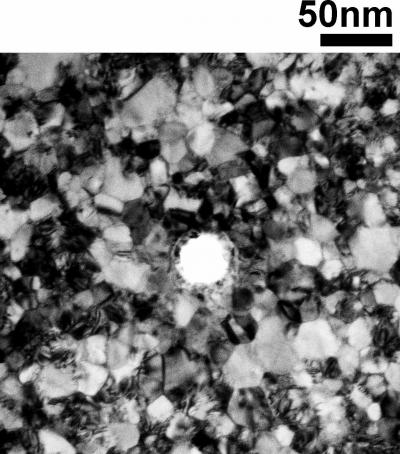A research team, led by Dr. Ulrich Rant from the Technische Universität München in partnership with a team of biochemists led by Dr. Robert Tampé from the Goethe University Frankfurt, has succeeded in improving the selectivity of a single-molecule, solid-state nanopore sensor, while retaining its sensitivity towards single molecules.
 This transmission electron micrograph shows a solid-state nanopore: The white circle in the middle of the picture. The otherwise patchy-looking structure results from the polycrystalline nature of a gold film that was evaporated onto the silicon nitride membrane (which cannot be seen). (Credit: Rant group, TU Muenchen Copyright TU Muenchen)
This transmission electron micrograph shows a solid-state nanopore: The white circle in the middle of the picture. The otherwise patchy-looking structure results from the polycrystalline nature of a gold film that was evaporated onto the silicon nitride membrane (which cannot be seen). (Credit: Rant group, TU Muenchen Copyright TU Muenchen)
The researchers have developed a powerful and reversible method to fine-tune the nanopore sensor to perform highly specific detection for targeted molecules. They attached molecular receptors within the nanopore sensor to provide a biological function to the detector.
The researchers used a 50-nm thick silicon nitride substrate to fabricate the nanopore sensor. They then created nanopores having a diameter of 20-50 nm in the substrate using reactive ion etching and electron-beam lithography. The nanopores were then metal coated with gold and titanium using vapor deposition method. A one-molecular-layer thick self-assembled chemical coating was then applied over the metal coating.
These nanopores with a tapered conical shape have a diameter of 25 nm at the narrow end. Biochemical receptors attached to the surface layer were designed to trap and halt proteins. During the study, the sensor was placed in a measurement chamber containing an electrolyte solution on both sides. An electric charge urged the protein molecules introduced into one side of the measurement chamber through the nanopores. Slight variations in electric current provided real-time measurements of individual molecules when they travelled via the nanopores or resided subsequent to their interaction with the immobilized protein. These data are helpful in detecting targeted molecules.
Using the novel nanopore sensor, the researchers detected recombinant histidine-tagged proteins and differentiated subclasses of natural IgG antibodies. Rant explained that the method used to attach individual proteins inside the nanopores is common and can be used for several existing recombinant proteins, thus allowing the solid-state nanopore to be equipped with the preferred biological functionality.
The partnership signifies a major step in nanodiagnostics and biosensory on a single-molecule level.